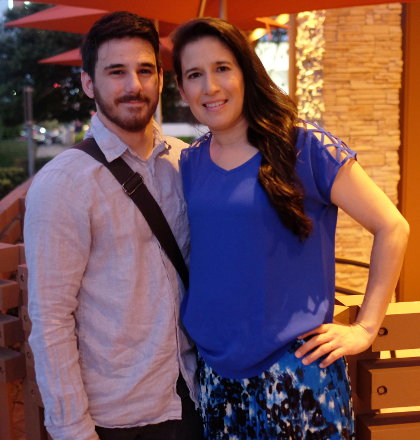 Lorena and I have not participated much in the education of the kids other than as cheerleaders since they started paying their own ways in graduate school three years back. So, it is nice to be able to report some new educational stuff. MIT Lincoln Labs who is funding Christian’s research offer him a summer research position this summer. Hopefully, he will be living in a dorm at Northeastern University which appears to right downtown (or within walking distance) Boston. It is an internship really, so now both Kelly and Christian have had technical internships at high tier research institutes, Kelly at the Applied Physics Laboratory at Johns Hopkins University and now Christian at MIT Lincoln Labs where he will continue his work in network information theory.
Lorena and I have not participated much in the education of the kids other than as cheerleaders since they started paying their own ways in graduate school three years back. So, it is nice to be able to report some new educational stuff. MIT Lincoln Labs who is funding Christian’s research offer him a summer research position this summer. Hopefully, he will be living in a dorm at Northeastern University which appears to right downtown (or within walking distance) Boston. It is an internship really, so now both Kelly and Christian have had technical internships at high tier research institutes, Kelly at the Applied Physics Laboratory at Johns Hopkins University and now Christian at MIT Lincoln Labs where he will continue his work in network information theory.
Category: Education Page 4 of 18
Christian uses his new whiteboard to think about hard problems while listening to music!
Lorena took this video surreptitiously.
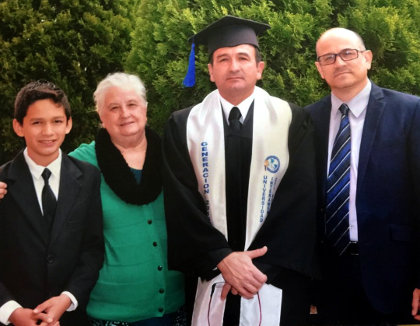 CONGRATULATIONS LYNN!!!! We are all very proud of Tio Lynn, child number three (Lorena is four) of Grandpa Lauro and Grandma Conchita. He earned his law degree and we all now have to call him Licenciado Lynn Neri. He is only a few months away now from meeting all the regulatory requirements to practice law in Mexico. He went through a lot of hard work to get to this worthy goal. That brings the family degree count up to three engineering degrees (Tios Lauro, Jorge and Rigoberto) and Lynn’s law degree. Lorena is still at work on her degree and I expect she will finish it before to long, if we ever quit uprooting her so she actually has the time to finish.
CONGRATULATIONS LYNN!!!! We are all very proud of Tio Lynn, child number three (Lorena is four) of Grandpa Lauro and Grandma Conchita. He earned his law degree and we all now have to call him Licenciado Lynn Neri. He is only a few months away now from meeting all the regulatory requirements to practice law in Mexico. He went through a lot of hard work to get to this worthy goal. That brings the family degree count up to three engineering degrees (Tios Lauro, Jorge and Rigoberto) and Lynn’s law degree. Lorena is still at work on her degree and I expect she will finish it before to long, if we ever quit uprooting her so she actually has the time to finish.
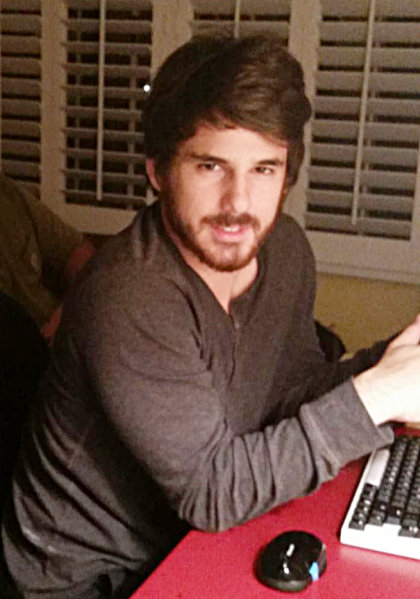 Christian hitched a ride with his friend Nathan to spend Thanksgiving weekend with the Rizos in San Diego. Kelly flew down last night from Seattle to join the crowd. We tried to figure out a way to be all together this year, but it just did not make sense. We could not be happier about the alternative as the Rizos selflessly made it all work out (again).
Christian hitched a ride with his friend Nathan to spend Thanksgiving weekend with the Rizos in San Diego. Kelly flew down last night from Seattle to join the crowd. We tried to figure out a way to be all together this year, but it just did not make sense. We could not be happier about the alternative as the Rizos selflessly made it all work out (again).
Kelly sent out this photo of Christian working on term papers, test preparation and homework. This is probably the last Thanksgiving he will ever have to do this. He has one more semester with a full load of classes followed by a semester with only one class, then he will be all dissertation all the time until he graduates. That is something for which he can certainly be thankful this Thanksgiving.
Lorena and I will spend some time with friends, but sometime during the weekend, we will cook a turkey–the thought of not having turkey sandwiches and other leftovers is more than we can bear.
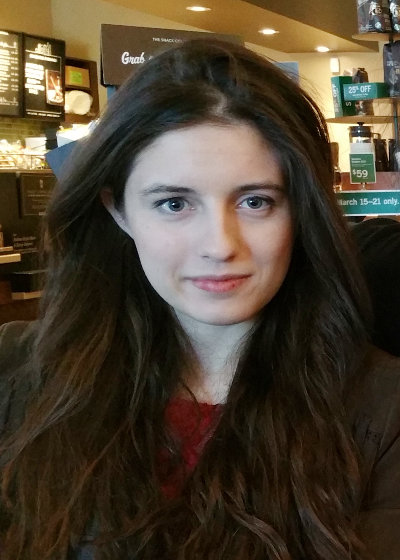 Kelly sent me a great article on how to raise successful girls. I think it is great and almost surely applies to boys as well. It is titled Want to Raise Successful Daughters? Science Says Nag the Heck Out of Them and was pretty much the operating mode of our family from about when the kids turned two (tongue in cheek, but maybe only slightly). I honestly think there is a good bit of truth to the claims in the article. We had our own little spin on it, but I cannot say that I am not guilty of at least a little bit of this kind of behavior. On the other hand, the über-tiger-mother-from-hades meme is one we rightly loathed so we are not buying this lock, stock and barrel, just maybe lock and stock.
Kelly sent me a great article on how to raise successful girls. I think it is great and almost surely applies to boys as well. It is titled Want to Raise Successful Daughters? Science Says Nag the Heck Out of Them and was pretty much the operating mode of our family from about when the kids turned two (tongue in cheek, but maybe only slightly). I honestly think there is a good bit of truth to the claims in the article. We had our own little spin on it, but I cannot say that I am not guilty of at least a little bit of this kind of behavior. On the other hand, the über-tiger-mother-from-hades meme is one we rightly loathed so we are not buying this lock, stock and barrel, just maybe lock and stock.
By the way, does the girl in this picture look harassed and put out?
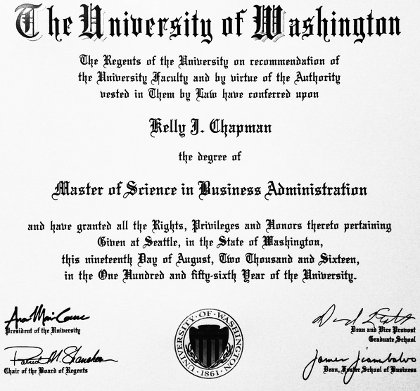 I wanted to post Kelly’s Master of Science in Business Administration diploma as it is the current high mark in her educational efforts. She is almost certainly not done yet (talked to one of her professors last night about next steps), but she is at work now in a good job in downtown Seattle learning new stuff, loving her job and her new co-workers and on the way to figuring out what she really wants to do as a vocation. We are very happy and excited for Kelly.
I wanted to post Kelly’s Master of Science in Business Administration diploma as it is the current high mark in her educational efforts. She is almost certainly not done yet (talked to one of her professors last night about next steps), but she is at work now in a good job in downtown Seattle learning new stuff, loving her job and her new co-workers and on the way to figuring out what she really wants to do as a vocation. We are very happy and excited for Kelly.
Some really good stuff is happening, some of which has to do with schooling and some with work. Lorena and I are spending most of the day indoors today, not because we want to be here on a beautiful sunny fall day (not to hot for a change), but because we have to work. I have taken on another project to help with a medical device for developing countries and Lorena is studying for her Statistics class. She has two classes this term, so she is pretty busy. That is all good stuff, but not the subject of this post. I just wanted to put up a marker because some good decisions were made to make a change, but the exact direction is not yet established. I think in a couple of days we can celebrate it and talk about it.
 We found out today that Lorena made it past the waitlist and is now enrolled into two online classes at Clackamas Community College. She only has a few classes left and this was the best way to get her to her degree. It is a challenge because one of the classes is Statistics, a pretty hard class. I actually use statistics on a daily basis at my day job, but her best hope for good help is with Kelly (BS Statistics) and Christian (BS Applied Mathematics). We are very excited for Lorena and hope she can finish either this Spring or next Fall. After (in October) 24 years of marriage, I still relish the thought that we are paying for education. I hope it never ends.
We found out today that Lorena made it past the waitlist and is now enrolled into two online classes at Clackamas Community College. She only has a few classes left and this was the best way to get her to her degree. It is a challenge because one of the classes is Statistics, a pretty hard class. I actually use statistics on a daily basis at my day job, but her best hope for good help is with Kelly (BS Statistics) and Christian (BS Applied Mathematics). We are very excited for Lorena and hope she can finish either this Spring or next Fall. After (in October) 24 years of marriage, I still relish the thought that we are paying for education. I hope it never ends.
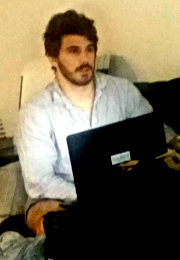 Christian got on an airplane a little after midnight on Wednesday to arrive here in Texas at five in the morning yesterday. He is here to celebrate his last weekend as a twenty year old. He got now sleep last night, but had a homework assignment due at three (Texas time), so he did not get to go to bed until yesterday afternoon. The crazy part is that, the problem he was required to solve assumed some things that were not stated in the problem and that mathematicians can never assume. He ended up writing a note to the professor to say how he just did not know how to solve the problem “generally.” The professor wrote back and said he never intended for the problem to be solved generally, just in some important cases. So Christian, in the time-honored tradition of graduate students everywhere, got to waste a night solving a problem that was unsolvable based on the incomplete information provided in the problem statement.
Christian got on an airplane a little after midnight on Wednesday to arrive here in Texas at five in the morning yesterday. He is here to celebrate his last weekend as a twenty year old. He got now sleep last night, but had a homework assignment due at three (Texas time), so he did not get to go to bed until yesterday afternoon. The crazy part is that, the problem he was required to solve assumed some things that were not stated in the problem and that mathematicians can never assume. He ended up writing a note to the professor to say how he just did not know how to solve the problem “generally.” The professor wrote back and said he never intended for the problem to be solved generally, just in some important cases. So Christian, in the time-honored tradition of graduate students everywhere, got to waste a night solving a problem that was unsolvable based on the incomplete information provided in the problem statement.
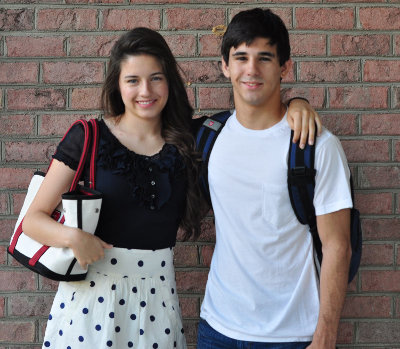 Seeing all the little kids starting out in kindergarten and first grade on Facebook and Instagram, we started feeling a little melancholy when we realized Christian starts back to class today for what might be his last formal year of classes in the school year forever. Christian was sixteen and Kelly was eighteen at the time. We found this old picture of Kelly and Christian’s first day of school (their Junior year there after two years at Wake Technical Community College) at NC State. Christian is taking classes in Quantum Physics and Functional Analysis (Math) this semester.
Seeing all the little kids starting out in kindergarten and first grade on Facebook and Instagram, we started feeling a little melancholy when we realized Christian starts back to class today for what might be his last formal year of classes in the school year forever. Christian was sixteen and Kelly was eighteen at the time. We found this old picture of Kelly and Christian’s first day of school (their Junior year there after two years at Wake Technical Community College) at NC State. Christian is taking classes in Quantum Physics and Functional Analysis (Math) this semester.
From an article titled Pressed By Common Core And LGBT Agenda, More Families Homeschool at The Federalist:
One major reason families homeschool is for academic quality. The United States spends roughly $12,000 per student on education, which is more than every other country in the world except Lichtenstein. While our math and science scores have improved slightly over the last few years, we still rank in the middle of the global pack.
In addition, LGBTQ activists have successfully inundated schools with their approved ideology inside sex education that starts now as early as kindergarten. With these problems in public schools and many families unwilling or unable to afford the cost of private schooling, more and more families are choosing homeschooling as an alternative. This ensures they can avoid educational indolence and moral apathy while picking and choosing what learning method, curriculum, and schedule works best for their family.
Every year my own homeschool circle increases and there are waiting lists for the cooperative classes we participate in—and I live in a state that boasts some of the wealthiest counties and highest-praised public school systems in the country. Data released last year from the U.S. Department of Education shows that “between 2003-2012, the number of American children between ages 5 to 17 who are homeschooled has risen 61.8 percent, and that the percentage homeschooled in that age range has increased from 2.2 to 3.4 percent.” Parents are pursuing a style of education they can control that will enrich their children, now with very little fear of the stigma that used to surround it.
This is a great article in that it talks about the normalization of homeschool and the reasons it can be a great way to educate one’s children and not just the reasons to remove them from the caustic government school environment that delivers a bad education. I think this article is just another manifestation of what people are trying to do to fight a morally and spiritually bankrupt culture like the one described in the post before this one.
Christian recently wrote a technical post on his blog about demosaicing of images captured with Fujifilms new X-trans sensor. He tested some methods to perform the demosaicing, wrote a first pass of his own demosaicing code and then posted about it all on the blog. That kind of thing is pretty interesting to guys who work in that area and/or have cameras. He got a couple of nice comments on the blog post itself, but what boggled my mind was that some guy wrote this over on Hacker News where his article got some coverage:
[sic] someone is wasting a [sic] phd scholarship to solve a problem that only [sic] exist because people keep dumping money on a company that damages their own product by now releasing source or specs?
What a tool. That is like saying people are wasting McDonald’s, Amazon’s or the local donut shop’s money to solve a problem just because the guy solving the problem happens to work for that company. PhD scholarship students are not slaves. Some of their time is their own. Beside that, Christian is not on scholarship. He is a Research Fellow and A Dean’s Fellow, so he is an employee, just like if he were working at McDonald’s, Amazon or the local donut shop. And who cares how the problem was caused. People have the problem and it an interesting problem. Why not solve it? What kind of a waste of oxygen writes a comment like that?
 Just a day after I wrote a post on The Veracity of the Bible which included links to articles about fairly recent archaeological discoveries that confirm the biblical record, Eric Metaxas wrote an article that describes the blinders worn by much of academia when they evaluate these kinds of new evidences. In the article, titled A Flood of Evidence, Chronological Snobbery and Archeology, he describes a concept using terms first coined by C.S. Lewis. The article starts out like this:
Just a day after I wrote a post on The Veracity of the Bible which included links to articles about fairly recent archaeological discoveries that confirm the biblical record, Eric Metaxas wrote an article that describes the blinders worn by much of academia when they evaluate these kinds of new evidences. In the article, titled A Flood of Evidence, Chronological Snobbery and Archeology, he describes a concept using terms first coined by C.S. Lewis. The article starts out like this:
In his conversion story, “Surprised by Joy,” C. S. Lewis explains how his close friend, Owen Barfield, demolished his “chronological snobbery.” Lewis defined chronological snobbery as “the uncritical acceptance of the intellectual climate of our own age and the assumption that whatever has gone out of date is on that count discredited.”
In Lewis’s time, much of academia was already convinced that every past generation formed a staircase of progress, leading (of course) to enlightened modernity. And since Lewis’s death, many intellectuals have only become more convinced of their own perch at the pinnacle of history. These days, we barely even notice the snobbery.
Metaxas goes on to list some relatively recent discoveries with links to some great articles about what they mean with respect to the veracity of the biblical record. An example of one of the discoveries is described in a post on the same site about confirmation that King David was an actual, living breathing person (the famous Tel Dan Stele). There are additional links in and after the story to additional confirmations. Then he goes on to describe the silliness of chronological snobbery and how it dampens the acquisition of a better understanding of ancient history.
 One of our most fondly remembered homeschool outings was a visit to the traveling exhibition of the Dead Sea Scrolls at the North Carolina Museum of Natural Sciences back in 2008 when the kids were in their early teens. It was particularly exciting for me because it had been a hobby, an avocation really, to read Ancient Near East history for the previous twenty five years to try to get an understanding of what we really know about the events that transpired in the Old and New Testaments. Of course the New Testament and the events surrounding Jesus’ time here on Earth or the most well attested events in antiquity as represented by the documents available to us today and the proximity in time of those documents to the actual events. As part of our world view studies in homeschool, we studied all these things carefully and it was nice to see the artifacts themselves. That this exhibit arrived in Raleigh was coincident with our studies was truly serendipitous.
One of our most fondly remembered homeschool outings was a visit to the traveling exhibition of the Dead Sea Scrolls at the North Carolina Museum of Natural Sciences back in 2008 when the kids were in their early teens. It was particularly exciting for me because it had been a hobby, an avocation really, to read Ancient Near East history for the previous twenty five years to try to get an understanding of what we really know about the events that transpired in the Old and New Testaments. Of course the New Testament and the events surrounding Jesus’ time here on Earth or the most well attested events in antiquity as represented by the documents available to us today and the proximity in time of those documents to the actual events. As part of our world view studies in homeschool, we studied all these things carefully and it was nice to see the artifacts themselves. That this exhibit arrived in Raleigh was coincident with our studies was truly serendipitous.
The Old Testament is so far removed from us that, historically speaking, it is a lot more difficult to find the level of verification for those events from either the available documentary evidence or from archeology. Still, there not nothing and what there is continues to confirm the biblical record. I was very happy to find a couple of articles that talked to all these issues in the last couple of days. The first is a blog post about the way the canon of the New Testament was selected. It put into one article what it took me a long time to figure out reading about it piecemeal. The upshot is hat 22 of the books of the New Testament, the gospels, the Acts, Paul’s epistles (including Hebrews), I Peter, I John and Revelations have always been universally recognized as canonical. In addition, things like the Gospel of Thomas, the Gospel of Peter, the Acts of John, etc. have been considered to be heretical from antiquity. There are a couple of other categories that describe how the canon got to 27 books and no more. I highly recommend this concise article titled An Essential Key to Understanding the Development of the NT Canon.
In addition to that, I found a blog post titled Historical Reliability of the Old Testament: Resources for Study. It is a series of links to articles about what we do know and what we don’t know, historically speaking, about the Old Testament. The articles talk about the controversies, the archeology, etc. of the Exodus, the Babylonian exile and other events and persons in the Old Testament. I good survey of what we know today and a good place to start (from the list) is this article by Peter J. Williams.

Learning new things keeps me sane. The reality is that it is hard work to learn new stuff and I am not that fond of new stuff. I am fond, though, of having learned new hard stuff. I am currently on a kick to upgrade my programming skills. A lot of programming is minutiae–a massive jigsaw puzzle of minutiae tied together with clever tricks and best practices that are not always obvious. Right after I arrived in Texas I worked on a webified version of my old GaugeCam project software. I did not get very far–just some user interface stuff, but I put it onto a little BeagleBone Black embedded computer that runs Xubuntu and serves the site from our little apartment. You can access the site by clicking here (not so much to see). The thing has been up and running for several months now. I am kind of amazed.
The upshot is that I thought I would change the focus of my learning effort a little, put up a second page on the same server and see if I could serve live images from two cameras and do some realtime image analysis all from this wimpy little embedded computer. I started on it last night. We will see if I get anywhere with it over the next few months.

Lorena and I planned to drive to Wichita last Friday for a working weekend. I turned out that the people with whom we were to work planned to leave after lunch on Saturday so we decided a conference call working session made a lot more sense than twelve hours of driving followed by four hours of work. I have a ton of things to accomplish at my day job and planned to spend the bulk of what time I had left on the weekend for that. I accomplished two things: the conference call (four hours on Saturday morning) and a lot of “contemplation” sessions with Kiwi like the one shown in the image above. Well, there was a little bit more to it than that–Kelly and Christian both called and we talked for long stretches on life and their current paths.
The talks with Kelly and Christian were the most productive parts of the weekend. Christian is at about the halfway point of his PhD program, living through the pain of his third Tempe summer and the bloom of graduate school is definitely off the rose. He is in a good place with his work–he and his professor are performing the final edits on a paper about the research he has performed over the last two years which they will submit in the next week or so. On the other hand, he spends so much time working, there is little time for anything else, so he is looking forward to the day when he can get a regular job where he goes to work in the morning, goes home in the evening and has weekends off–all in a place where the daytime temperature only hits triple digits four or five days per year.
Kelly, on the other hand, is not so enamored with the actual day to day work of her degree. She does not think she wants to do marketing research and/or be an academic, so she is trying to decide whether to finish where she just to have her graduate school complete forever, or switch graduate schools and go back to a degree and field that is a little bit more rigorous–probably in the use of statistics. It is a hard decision, but she has a great opportunity to go either way. The good thing is that she is thinking about it objectively. It might be worth it to just finish out–she is in a good place to do that academically, but if she hates it, she might be better served to step back, reconsider what she wants and move onto something for which she has a passion.
After hammering on The Atlantic yesterday for shoddy reporting, I found an article they published that suggests that taking harder classes in high school does not necessarily translate to future success in college. The article is titled When the Value of High School Is Exaggerated, but whose title on the tab of my browser is Success in High School Doesn’t Mean Good Grades in College. I think both titles and the articles point describe our experience well:
Instead, the pair [who did the research on which the article was based] thinks that if high schools want to prepare students for college, they should focus less on specific content and more on critical thinking and reasoning. Most students will forget the specifics of, say, mitosis shortly after they take their AP biology exam, but they might retain the broader concepts of conducting an experiment and presenting evidence. “It’s really the underlying skills that stay with people,” Hershbein said. That may be one reason that calculus seems to be the one exception in the research, where students who have exposure in high school benefit “mildly” in terms of better college grades. That’s “probably because it is based on cumulative learning to a greater extent than other subjects,” the authors note.
Our premise all along has been that there are a lot of students who could easily transition to community college after the eighth grade. This allows the students to avoid the academic and cultural malaise that characterize the vast majority of traditional schools in America (government and private) and move into an environment much better suited for success in their future endeavors. The community college system in the US is profoundly better at preparing students for life after school either in a trade or further educational endeavor at a four year college. You can read about our experience pursuing that path in the series of posts on this blog titled Why Not Skip High School?
The Atlantic is one of those magazine I never read. To find one good article, I need to wade through 100 of them whose quality, content and or morality frankly disgust me. That being said, I receive links for great articles in The Atlantic from two or three different people on a semi-regular basis. If you follow this link, you will see I think highly enough of the good articles that I write about them on this blog. Whenever I start thinking they are on the right track an article like this one titled Student’s Broken Moral Compass show up and I resolve never to read them again on my own, but wait until someone with a stronger stomach than mine wades through the dreck to find the diamonds.
The thing that put me into a state of high dudgeon about this article was the proprietary aire of the piece–like it is actually OK for failed government schools and the education union thugs to assign the teaching of ethics of other people’s children to themselves. Or that an author for a hard left moderate1 rag like The Atlantic can write about it like it is a foregone conclusion that that needs to be done. There is definitely a problem with all this, but it should be obvious that it begins with parents and a culture willing to assign the young and innocent to mediocrity and frequent failure, both morally and academically, at the hands of these progressive drones.
I know, I know, I have not yet made the caveat that there are great teachers in the system like this one. I make that caveat now (for my own safety).
1. Kelly tells me “it is moderate with a left bent tempered by many right-leaning writers,” but I do not think I am willing to say many or moderate. I might go along with “a few writers who are right-leaning on a few issues.” The article described in this post was definitely hard left with a totalitarian bent.
There is a good article in the Federalist that captures the thoughts of many of us relative to the the upcoming election, politics in the USA and around the world and our inability to have much control over any of it. The article gets some things right:
As my 88-year-old neighbor, a lifelong Republican, put it: “Well, I’m not voting for Hitler.” She paused. “But I could never, ever bring myself to vote for Clinton.” She threw her hands up: “What to do!”
This is a big problem. Many politically minded people are feeling unrepresented, exhausted, and out of options. Unfortunately, this disillusionment likely will continue beyond November.
This is exactly how I feel about the current situation. The article also says some things about the centralization of national government and the decentralization of virtually everything else in the country that resonates with me. All this feels like something new is happening. That or something old and bad, but on a much bigger scale and it leaves me feeling disoriented–not knowing what I should do about it. The article gives the good advice to get involved locally over those things you are able to influence. At the same time it gets some stuff monumentally wrong:
The breakdown of Washington can be seen in the failure to adequately address: Worker displacement from globalization and technological change; providing a sound primary education and affordable secondary education; an entitlement system that can adapt to changing demographics; a safety net that helps the poor rise up the ladder of economic independence; a regulatory architecture that thwarts cronyism. And so on and on.
In that, I think the problem is that many, probably most government bureaucrats believe it is within the purview of national government to address these things when they are actually the source of the problem, particularly when they meddle in the affairs of family by taking away educational choice and try to take away the mandate of state governments to manage the bulk of the rest of these problems. Nevertheless, I liked the sentiment of the article and plan to continue to follow the advice to stay away from the main stream media and try to do more in my own personal community (local, church, family and friends).
Scott McNealy is one of the co-founders of Sun Microsystems and a big proponent of something called open source education. I am on board with what he says. His public education philosophy tracks closely with mine. He explains the whole concept of open source education materials and what he has done about it here:
Here is a link to the Curriki, the free K-12 curricula and resource website he describes in the video.
What brought this back to my radar was a link my friend Andrew sent me to an online video interview of McNealy. He said, “Discussion of education starts around 28:50. Right at 31:55, he says a few words that I thought would really ring true for you.” Boy howdy was he right. I transcribed just a little bit of it here to give you the flavor McNealy’s remarks on education, part of which is about his ideas on education. I could not embed the video, but you can get to it by clicking here. I might note that he starts talking about education well before 28:50 and that is certainly worth a listen, too.
Interviewer: What is the state of the art right now? What’s going on in classes these days?
…
Scott McNealy: Monopoly is the wart.
Interviewer: In this case, the teachers union monopoly?
Scott McNealy: Who is the biggest monopolist out there? The government. So now we have the government sector union teachers driving the architecture, the process, all the rest of it. Meanwhile technology is going up, up and away.
There is much more in the video. McNealy talks about the concept of going to school, not to live one’s dream, but to get a job. The thing I really like about McNealy is that he put his money where his mouth was and did something about the whole educational mess in America. Our little family did it on a micro level by pulling our kids out of the traditional/government school morass while McNealy did it on an über-macro level and set up a system whereby every kid in America and around the world can benefit. Kudos to him!
